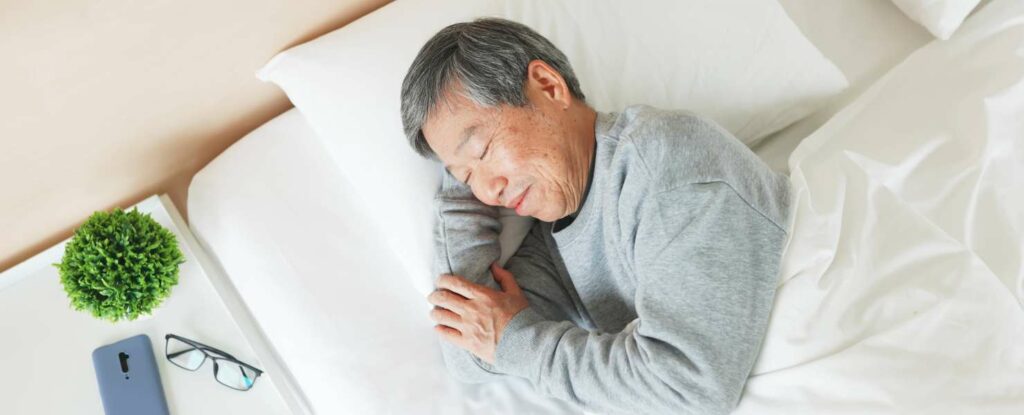It seems like most of us complain about not getting enough sleep. Stress about our daily lives and responsibilities keep us awake, or we get too engrossed in watching a show or movie that we didn’t meet our regular bedtime. Or in other cases, issues like sleep apnea or insomnia affect how much quality sleep we’re able to get.
On the other side of the spectrum, some of us suffer from an opposite problem: a concern about getting too much sleep.
It could be that you or the older adult in your life is suddenly napping much more than they used to or sleeping longer every day. You worry whether something is wrong and if getting too much sleep is healthy or not.
Let’s take a closer look at just how much sleep is recommended for older adults, what might cause more sleep than usual, and when to seek help.
Sleep Recommendations for Older Adults

Adults age 65 or over should aim for seven to eight hours of sleep a night, according to the CDC. This recommendation isn’t all that different from what’s recommended for adults under age 65, which for the most part is seven hours of sleep or more each night.
Of course, everyone may be a little different. Some people swear that they get by just fine on six hours a night, while others find themselves feeling better closer to nine hours a night. One key issue here is knowing what’s the norm for you or your loved one and comparing to that.
What May Cause an Older Adult to Sleep More?

There are several reasons why an elderly adult may begin to sleep more:
- They have poor sleep quality at night.
Problems like obstructive sleep apnea, restless legs syndrome, and insomnia may interfere with getting a good night’s sleep. In fact, insomnia is the most common sleep problem among those aged 60 and older, according to the National Institute on Aging. In turn, they are napping more during the day. This makes it seem as if they are sleeping more when in reality, they’re trying to catch up from the sleep that they previously lost. - They are dealing with medication side effects.
Many medicines can make a person feel drowsy. Conversely, your older loved one may use a medication that keeps them up at night, leading to more daytime sleeping. - They are depressed, which causes them to feel more run-down.
Contrary to what you might have heard before, depression is not something that naturally happens to everyone as we get older. So, it’s worth getting this possible cause checked out. - They are bored and don’t have enough stimulation during the day.
This leads to more naps and/or a longer sleep time at night. - They are in pain.
Although painful joints and pain in other parts of the body can interfere with sleep, it also can lead an older loved one to sleep more, to try and avoid the pain. - They have low energy.
Many of us have gone through time periods where we’ve felt lower energy, for a variety of reasons. It could be a vitamin or mineral deficiency, the effect of a medication, or something else. The same can happen to older adults. - There’s an underlying medical cause.
Whether it’s advancing dementia, an infection, or something else, a medical issue is a frequent cause for longer sleep periods. - They are in hospice.
To help keep someone in hospice comfortable, there is often pain medication involved. Pain medication can make someone feel sleepier. - Changes to the circadian rhythm.
As we age, our internal clock that regulates our sleep-wake cycle can shift, causing older adults to feel sleepy earlier in the evening and wake up earlier in the morning. This can lead to earlier bedtimes and earlier wake-up times, which may contribute to the perception of increased sleep time.
When to See a Doctor for an Older Adult Sleeping Too Much

Like many health issues, finding out why your loved one is sleeping more can take some detective work. The answer isn’t always obvious, and there may be a combination of factors causing the change in sleep patterns.
Here are a few steps to take if you’re concerned about an older adult who is sleeping more frequently:
- Talk with your loved one about their sleep at night.
Do they think that they are getting enough sleep? Have they had some recent changes that affect their sleep patterns? If they have existing sleep issues, such as sleep apnea, are they using any medical equipment (like a CPAP) to help them at night? Don’t rule out the fact that if they have sleep apnea and they use a CPAP, a poorly fitting mask could contribute to sleep issues. It will require a little investigation and may be something to discuss with their doctor. - Set an appointment with their health care provider for further analysis.
The provider will ask questions, conduct a physical exam, and may order lab testing. Lab testing can help provide clues to certain nutrient deficiencies (like iron) or other numbers that may be off and contributing to increased tiredness. It’s also possible that an illness or infection is affecting sleep quantity or quality. - Make sure that they’re staying busy during the day.
If boredom is a possible cause of too much sleep, double check that your loved one is staying active enough. Is there physical activity or social activities that can help keep them busier? If you aren’t currently tracking their calendar, consider an app such as WayWiser to keep better tabs on daily activity.
Alzheimers/Dementia and Getting More Sleep
Those with Alzheimer’s or dementia often find that their sleeping habits change, with some sleeping for longer amounts of time or sleeping less. Sleeping more is especially common in the later stages of dementia. Some will wake up multiple times or wander at night. All of this can have a negative effect on sleep quality both for the person with Alzheimer’s or dementia as well as their caregiver.
Sleep also becomes an issue in those with dementia or Alzheimer’s who can no longer tell the difference between night and day. It’s possible that they will end up staying up at night and then sleeping during the day.
How to Create a Better Night’s Sleep

If the analysis you do finds that your loved one just needs better sleep at night, then work with them to create a better sleep environment. Here are a few suggestions:
- Suggest that they stick to a regular bedtime and wake-up time.
- Steer clear of afternoon naps, which can make it harder to go to sleep at night.
- Help set up low lighting to use close to bedtime.
- Suggest avoiding caffeine (especially beyond the morning) and alcohol. Alcohol may initially help someone get to sleep but then it can keep them awake.
- Remind your loved one to stick with lighter meals in the evening, so they don’t have trouble sleeping because they are too full.
- Work with them to create a calming bedtime routine that signals to the body that it’s time to go to sleep.







